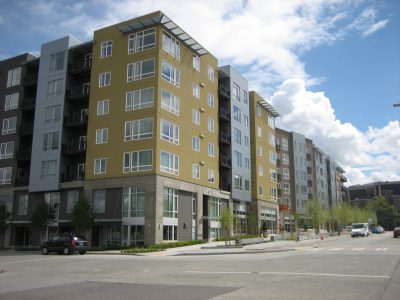
Apartment building
You might assume that modifications to allow us to age gracefully in our own home are available only to those who own their homes. Perhaps you imagine that if you rent, you are not allowed to make change to your living environment and your only option for an easier living environment might be to leave your apartment. Not so!
The Fair Housing Act (FHA) prohibits discrimination based on race, color, religion, national origin, and sex. When the act was amended in 1988, it was changed to include discrimination against people due to disability and due to familial status (the presence of children under 18). The Fair Housing Act is enforced by the US Department of Housing and Urban Development (HUD). This Act makes it unlawful for any person to refuse to “make reasonable accommodations in rules, policies, procedures, practices and services when such accommodations may be necessary to afford… person(s) [with disabilities] equal opportunity to use and enjoy a dwelling.”
The FHA covers most housing. The Act does not cover Owner-occupied buildings with 4 or fewer units, housing operated by private clubs and some single-family housing rented without the use of a broker. Multi-family housing is covered.
The Fair Housing Act has been in effect for over twenty years but still both renters and landlords are often confused about their rights. Recently, the Department of Justice and HUD jointly released new guidance on “Reasonable Modifications” under the Fair Housing Act.
One type of discrimination prohibited by the FHA is the refusal by housing providers or homeowner associations to permit a reasonable modification when the modification may be necessary to afford the person full enjoyment of the premises. A reasonable modification is a structural alteration of the current building occupied by or to be occupied by a person with a disability. Although the housing provider or homeowner association must permit the modification, the tenant (or prospective tenant) is responsible for paying the cost of the modification. Examples of reasonable modifications include widening doorways to make rooms more accessible to persons who use wheelchairs or installing a ramp to provide access to a public or common use area, such as a clubhouse.
If a tenant makes a structural alteration to the premises that affects the use of the premises for the next tenant, the housing provider may require the tenant to remove that alteration. If the alteration doesn’t change future tenants’ use or enjoyment of the premises, then tenant may leave the alteration. For example, if a tenant used a mobility device and made an alteration to widen the door to the bathroom to accommodate that mobility device, it is not reasonable for the housing provider to request that the tenant restore the door width to its original size, since the wider door does not substantially alter the use of the bathroom. If a tenant removed a bathtub and installed a no-step shower, the housing provider could reasonably request that the tub be replaced for the next tenant because a shower does not provide the same experience as a tub.
Fair Housing also allows for “reasonable accommodations”. Sometimes a policy or procedure may have a different effect on a person with a disability than on others. In these cases, modification of a standard policy or procedure may be required to allow a person with a disability equal opportunity to enjoy and use a dwelling as their neighbors. An example that is often used is when an apartment complex has a standard policy that all parking spots are first-come, first-serve. A resident, who has substantial mobility impairment, requests a reserved parking space close to the entrance to her building. There are available parking spots near her building that meet her needs that are currently available to any resident on a first-come, first-served basis. The landlord must make an exception to his policy and allow her an assigned spot.
For more information on your rights and what to do if you suspect you have been discriminated against, please see http://www.justice.gov/crt/housing/fairhousing/reasonable_modifications_mar08.pdf
Originally published on www.silverplanet.org
Leave A Comment